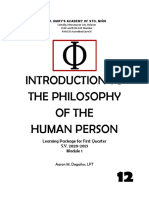DIASS Module 2 3rd Q Ok
DIASS Module 2 3rd Q Ok
Uploaded by
Lady PilaCopyright:
Available Formats
DIASS Module 2 3rd Q Ok
DIASS Module 2 3rd Q Ok
Uploaded by
Lady PilaCopyright
Available Formats
Share this document
Did you find this document useful?
Is this content inappropriate?
Copyright:
Available Formats
DIASS Module 2 3rd Q Ok
DIASS Module 2 3rd Q Ok
Uploaded by
Lady PilaCopyright:
Available Formats
DISCIPLINE AND IDEAS IN THE APPLIED SOCIAL SCIENCE
THIRD QUARTER
MODULE NO. 2
Topic: COUNSELLING AS A DISCIPLINE
Source: https://onlinecounselingprograms.com/resources/when-to-see-a-counselor/
I. INTRODUCTION
Counselling allows the provision of help so that others may respond well to
life’s challenges. It is a profession that also promotes one’s personal learning and
growth. As a professional, counsellors need training and academic preparations to
acquire the competencies needed in promoting personal growth and necessary
attitudinal change among individuals. Even as counsellors specialize in different areas
of work in different settings, they are all held accountable for the well-being of their
clients. This accountability may be guided by professional and ethical standards that
will protect both the client’s and the counsellor’s welfare.
II. OBJECTIVES
Identify the goals and scope of counselling.
Explain the principles of counselling.
Identify specific work areas in which counsellor’s work.
Distinguish between ethical and unethical behaviors among counsellors.
III. CONCEPT SUMMARY
Counselling can also promote greater self-esteem and assertiveness,
decrease anxiety and depression, and give you the ability to set boundaries
for yourself and others.
The purposes and goals of counselling can be categorized into major and
specific goals. The crucial element in the establishment of goals in the
DIASS/ Third Quarter Module 2/ SY 2021 – 2022/ Page 1 of 9
counselling process is the party who sets these goals. The client takes the
lead while the counsellor assists.
Counselling can also help you learn new skills for building effective, better
relationships as well as develop solutions to issues that have previously
overwhelmed or negatively affected you.
Counselling offers help to others to respond well to the challenges of life.
IV. BRIEF DISCUSSION
COUNSELLING
Professional counselling can provide guidance to help people navigate life’s
challenges.
Counselling can provide people with the opportunity to share their views, be
heard, and gain new perspectives on their situations and experiences.
Counselling can help people to gain clarity surrounding issues.
GOALS OF COUNSELLING
Different individuals have different perceptions of what can be expected of
counselling. Individuals preparing to become counsellor’s, and those who seek
counselling, as well as parents, teachers, school administrators, and
governmental agencies, all differ in their expectations of the counselling
experience. The final designation of these goals is to be determined by the
counsellor and the client as a team.
Source:https://career.uconn.edu/blog/2021/04/29/counseling-clinical-psychology-graduate-school-interview-
questions/
DIASS/ Third Quarter Module 2/ SY 2021 – 2022/ Page 2 of 9
Counselling theorists do not always agree on appropriate counselling goals because
they are often general, vague, and saturated with implications.
FIVE COMMONLY NAMED GOALS OF COUNSELLING
Facilitating behavior change.
Improving the client’s ability to establish and maintain relationships.
Enhancing the client’s effectiveness and ability to cope.
Promoting the decision-making process and facilitating client potential.
Development.
SCOPE OF COUNSELLING
The scope for counsellors/ counselling psychologists is in schools, workplaces,
mediating family problems, stress management, mental health units. The scopes for
clinical psychologists are in private practice and hospitals. There is always the added
scope of research and/or teaching in some college/university.
Counselling deals with a myriad of human concerns the following are general
classifications of problems and reasons why clients need to consult counsellors.
Academic difficulties: These include the students’ difficulties in accomplishing
various requirements and meeting the standards of education, adjusting to
teaching methods used, handling academic pressures, maintaining good grades,
managing time, learning how to focus, and ensuring effective study skills.
Personal Concerns: These involve the difficulties that counselees encounter in
planning and setting their goals, handling stress, sustaining their motivation,
making informed decisions, identifying priorities, and solving problems.
Social Concerns: Difficulties encountered by counselees in relating with others
including dealing with rejections, handling peer pressure, coping with the
challenges of romantic relationships, and bullying.
Emotional Difficulties: Problems related to clients; emotions include dealing
with anxiety, nervousness, and heartache; coping with loneliness due to
DIASS/ Third Quarter Module 2/ SY 2021 – 2022/ Page 3 of 9
homesickness and rejection; managing negative emotions such as depression,
anger, and fear; and attaining emotional stability.
Source: https://www.mindshealer.com/mental-health/importance-of-counseling/
Psychological Challenges: These include handling persistent suicidal
behaviors; managing some forms of addiction such as smoking, drinking, and
computer gaming; dealing with eating or sleeping problems; understanding one’s
identity; and healing painful experiences.
Family Problems: Client’s primary concerns usually involve separation of
parents, absence of parents due to work abroad, single parenting, infidelity of
parents, hostile parenting, favoritism in the family, pregnancy, and parenting, and
an unpleasant home environment.
Career-related concerns: Primary career-related concerns include difficulties in
identifying one’s strengths and interests, lack of career goals and plans,
uncertainties in a job application, and difficulties with career choices (Hurlock,
1980).
THE CORE VALUES OF COUNSELLING
Each person is, in essence, naturally pure and good. The primary role of a counselor
is to give support so that the client will be able to attain autonomy. The essential values
that will compel and sustain you in doing this work are love and compassion. An
effective counselor finds the job’s intrinsic rewards more interesting than its extrinsic
ones. Deal with life through an attitude of gratitude and forgiveness.
DIASS/ Third Quarter Module 2/ SY 2021 – 2022/ Page 4 of 9
Source: https://www.recoveryfromaddictiononline.com/what-are-my-core-values/
Reviewing these ethical principles, which serve as the foundation of the guidelines,
often helps to clarify the issues involved in a given situation. The five bedrock principles
of autonomy, justice, beneficence, no maleficence, and fidelity are each vital in and of
themselves to a healthy counselling relationship. By exploring an ethical dilemma about
these principles, a counsellor may come to a better understanding of the conflicting
issues. A description of each of the five foundational principles follows.
Autonomy is the principle that addresses respect for independence, and self-
determination. The essence of this principle is allowing an individual the freedom
of choice and action. It addresses the responsibility of the counsellor to
encourage clients, when appropriate, to make their own decisions and to act on
their values. There are two important considerations in encouraging clients to be
autonomous. First, helping clients to understand how their decisions and their
values may be received within the context of the society in which they live, and
how they may impinge on the rights of others. The second consideration is
related to the client’s ability to make sound and rational decisions. Persons not
capable of making competent choices, such as children and some individuals
with mental disabilities, should not be allowed to act on decisions that could harm
themselves or others.
Justice, as Kitchener (1984) points out, is “treating equals equally and unequal’s
unequally but in proportion to their relevant differences” (p. 49). Justice does not
mean treating all individuals the same. If an individual is to be treated differently,
the counsellor needs to be able to offer a rationale that explains the necessity
DIASS/ Third Quarter Module 2/ SY 2021 – 2022/ Page 5 of 9
and appropriateness of treating the individual differently. An example of justice is
that a counsellor would give a person who is blind a form that is in braille, or
would go through the form with that individual orally, instead of giving him or her
standard written form to fill out. But the counsellor would treat him or her the
same as any other client in all other regards.
Beneficence reflects the counsellor’s responsibility to contribute to the welfare of
the client. Simply stated, it means to do good, to be proactive, and also to
prevent harm when possible (Forester-Miller & Rubenstein, 1992). Beneficence
can come in many forms, such as prevention and early intervention actions that
contribute to the betterment of clients.
Nonmaleficence is the concept of not causing harm to others. Often explained
as “above all, do no harm,” this principle is considered by some to be the most
critical of all the principles, even though theoretically they are all of the equal
weight (Kitchener, 1984; Rosenbaum, 1982; Stadler, 1986). This principle
reflects both the idea of not inflicting intentional harm, and not engaging in
actions that risk harming others (Forester-Miller & Rubenstein, 1992). Weighing
potential harm against potential benefits is important in a counsellor’s efforts
toward ensuring “no harm.
Fidelity involves the notions of loyalty, faithfulness, and honoring commitments.
Clients must be able to trust the counsellor and have faith in the therapeutic
relationship if growth is to occur. Therefore, the counsellor must take care not to
threaten the therapeutic relationship or to leave obligations unfulfilled.
When exploring an ethical dilemma, the counsellor needs to examine the situation
and how each of the above principles may apply to that particular case. At times, this
examination alone will clarify the issues so that the means for resolving the dilemma
becomes clear. When an initial review of the five foundational principles does not
provide direction, it is helpful to be able to work through the steps of an ethical decision-
making model. The following sections describe the steps of the ethical decision-making
model.
DIASS/ Third Quarter Module 2/ SY 2021 – 2022/ Page 6 of 9
2. INTEGRATION
What is the purpose of counselling to us?
__________________________________________________________________
__________________________________________________________________
__________________________________________________________________
_________________________________________________________________
_________________________________________________________________
How can counselling help you in dealing with such problems?
__________________________________________________________________
__________________________________________________________________
__________________________________________________________________
_________________________________________________________________
_________________________________________________________________
Why is guidance counsellor important in our society?
__________________________________________________________________
__________________________________________________________________
__________________________________________________________________
_________________________________________________________________
_________________________________________________________________
As an Ignacian Marian student, what are the common problems that you
experience? How do you handle them?
__________________________________________________________________
__________________________________________________________________
__________________________________________________________________
_________________________________________________________________
_________________________________________________________________
DIASS/ Third Quarter Module 2/ SY 2021 – 2022/ Page 7 of 9
V. EVALUATION/ASSESSMENT
A. THE MILLENIALS
Direction: This activity aims to identify you and your classmates’ problems or
concerns as adolescents. It also intends to determine the persons whose help you
seek when you have problems or concerns.
Instructions:
1. Form a group.
2. Each member must share his or her own experience when a peer approached
him or her for concerns and how he or she handled the situation.
3. After the sharing, the group will discuss the following questions:
a. What are your thoughts about the activity? How do you feel about it?
______________________________________________________________
______________________________________________________________
______________________________________________________________
_____________________________________________________________
_____________________________________________________________
b. When you have a problem, who do you approach for help? Why?
______________________________________________________________
______________________________________________________________
______________________________________________________________
_____________________________________________________________
_____________________________________________________________
c. What are the problems or concerns that you wish to consult with a guidance
counsellor? Why?
______________________________________________________________
______________________________________________________________
______________________________________________________________
_____________________________________________________________
_____________________________________________________________
DIASS/ Third Quarter Module 2/ SY 2021 – 2022/ Page 8 of 9
VI. REFERENCES:
Books:
Cleofe, Myreen P. (2020). DIWA Senior High School Series: Disciplines and Ideas in the
Applied Social Sciences. DIWA LEARNING SYSTEMS INC.
Dela Cruz, Arleigh Rose. (2016). Disciplines and Ideas in the Applied Social Sciences.
Phoenix Publishing House, Inc.
Websites.
https://www.betterhelp.com/advice/therapy/what-are-gestalt-therapy-techniques/
https://www.psychologytoday.com/us/therapy-types/adlerian-therapy
https://www.goodtherapy.org/learn-about-therapy/types/adlerian-psychology
http://www.dspmuranchi.ac.in/pdf/Blog/stages%20of%20counselling.pdf
https://www.elcomblus.com/the-different-settings-in-counseling/#private-sectors-
setting
https://careersinpsychology.org/start-a-community-counseling-career/
https://www.goodtherapy.org/learn-about-therapy/modes/school-counseling
https://www.elcomblus.com/roles-functions-and-competencies-of-counselors/
https://careersinpsychology.org/becoming-marriage-family-counselor/
https://www.elcomblus.com/areas-of-specialization-where-counselors-work/
https://www.counseling.org/docs/default-source/ethics/practioner-39-s-guide-to-
ethical-decision-making.pdf
https://www.learningdynamicsinc.org/child-adolescent-counseling/
https://nmu.edu/counselingandconsultation/group-counseling
https://onemindtherapy.com/therapy/career-counseling/
https://careersinpsychology.org/school-counseling/
https://www.verywellmind.com/what-is-a-mental-health-counselor-4157925
https://www.verywellmind.com/what-is-behavioral-therapy-2795998
https://www.verywellmind.com/what-is-cognitive-behavior-therapy-2795747
https://www.counselling-directory.org.uk/cognitive-
therapy.html#mindfulnessbasedcognitivetherapy
https://www.goodtherapy.org/learn-about-therapy/modes/school-counseling
DIASS/ Third Quarter Module 2/ SY 2021 – 2022/ Page 9 of 9
You might also like
- The Subtle Art of Not Giving a F*ck: A Counterintuitive Approach to Living a Good LifeFrom EverandThe Subtle Art of Not Giving a F*ck: A Counterintuitive Approach to Living a Good Life4/5 (6054)
- The Gifts of Imperfection: Let Go of Who You Think You're Supposed to Be and Embrace Who You AreFrom EverandThe Gifts of Imperfection: Let Go of Who You Think You're Supposed to Be and Embrace Who You Are4/5 (1142)
- Never Split the Difference: Negotiating As If Your Life Depended On ItFrom EverandNever Split the Difference: Negotiating As If Your Life Depended On It4.5/5 (917)
- Hidden Figures: The American Dream and the Untold Story of the Black Women Mathematicians Who Helped Win the Space RaceFrom EverandHidden Figures: The American Dream and the Untold Story of the Black Women Mathematicians Who Helped Win the Space Race4/5 (946)
- The Hard Thing About Hard Things: Building a Business When There Are No Easy AnswersFrom EverandThe Hard Thing About Hard Things: Building a Business When There Are No Easy Answers4.5/5 (361)
- Devil in the Grove: Thurgood Marshall, the Groveland Boys, and the Dawn of a New AmericaFrom EverandDevil in the Grove: Thurgood Marshall, the Groveland Boys, and the Dawn of a New America4.5/5 (273)
- The World Is Flat 3.0: A Brief History of the Twenty-first CenturyFrom EverandThe World Is Flat 3.0: A Brief History of the Twenty-first Century3.5/5 (2283)
- A Heartbreaking Work Of Staggering Genius: A Memoir Based on a True StoryFrom EverandA Heartbreaking Work Of Staggering Genius: A Memoir Based on a True Story3.5/5 (233)
- Enamel and Amelogenesis: Sharon Isidro-Alvarez, DMD, Ph.D. Our Lady of Fatima University College of DentistryNo ratings yetEnamel and Amelogenesis: Sharon Isidro-Alvarez, DMD, Ph.D. Our Lady of Fatima University College of Dentistry73 pages
- CHAPTER 12 Operating Lease - Lessor Operating LeaseNo ratings yetCHAPTER 12 Operating Lease - Lessor Operating Lease5 pages
- BloomsTaxonomySection 5 Chandio Vol3 Issue2No ratings yetBloomsTaxonomySection 5 Chandio Vol3 Issue211 pages
- Intro. To Philosophy MODULE 1 FIRST QUARTER S.Y. 2020 2021No ratings yetIntro. To Philosophy MODULE 1 FIRST QUARTER S.Y. 2020 202115 pages
- Synchronous Learning: Learn With Me, Let'S Begin!No ratings yetSynchronous Learning: Learn With Me, Let'S Begin!29 pages
- The Subtle Art of Not Giving a F*ck: A Counterintuitive Approach to Living a Good LifeFrom EverandThe Subtle Art of Not Giving a F*ck: A Counterintuitive Approach to Living a Good Life
- The Gifts of Imperfection: Let Go of Who You Think You're Supposed to Be and Embrace Who You AreFrom EverandThe Gifts of Imperfection: Let Go of Who You Think You're Supposed to Be and Embrace Who You Are
- Never Split the Difference: Negotiating As If Your Life Depended On ItFrom EverandNever Split the Difference: Negotiating As If Your Life Depended On It
- Hidden Figures: The American Dream and the Untold Story of the Black Women Mathematicians Who Helped Win the Space RaceFrom EverandHidden Figures: The American Dream and the Untold Story of the Black Women Mathematicians Who Helped Win the Space Race
- The Hard Thing About Hard Things: Building a Business When There Are No Easy AnswersFrom EverandThe Hard Thing About Hard Things: Building a Business When There Are No Easy Answers
- Elon Musk: Tesla, SpaceX, and the Quest for a Fantastic FutureFrom EverandElon Musk: Tesla, SpaceX, and the Quest for a Fantastic Future
- The Emperor of All Maladies: A Biography of CancerFrom EverandThe Emperor of All Maladies: A Biography of Cancer
- The Little Book of Hygge: Danish Secrets to Happy LivingFrom EverandThe Little Book of Hygge: Danish Secrets to Happy Living
- The Yellow House: A Memoir (2019 National Book Award Winner)From EverandThe Yellow House: A Memoir (2019 National Book Award Winner)
- Devil in the Grove: Thurgood Marshall, the Groveland Boys, and the Dawn of a New AmericaFrom EverandDevil in the Grove: Thurgood Marshall, the Groveland Boys, and the Dawn of a New America
- The World Is Flat 3.0: A Brief History of the Twenty-first CenturyFrom EverandThe World Is Flat 3.0: A Brief History of the Twenty-first Century
- The Sympathizer: A Novel (Pulitzer Prize for Fiction)From EverandThe Sympathizer: A Novel (Pulitzer Prize for Fiction)
- Team of Rivals: The Political Genius of Abraham LincolnFrom EverandTeam of Rivals: The Political Genius of Abraham Lincoln
- A Heartbreaking Work Of Staggering Genius: A Memoir Based on a True StoryFrom EverandA Heartbreaking Work Of Staggering Genius: A Memoir Based on a True Story
- On Fire: The (Burning) Case for a Green New DealFrom EverandOn Fire: The (Burning) Case for a Green New Deal
- The Unwinding: An Inner History of the New AmericaFrom EverandThe Unwinding: An Inner History of the New America
- Enamel and Amelogenesis: Sharon Isidro-Alvarez, DMD, Ph.D. Our Lady of Fatima University College of DentistryEnamel and Amelogenesis: Sharon Isidro-Alvarez, DMD, Ph.D. Our Lady of Fatima University College of Dentistry
- CHAPTER 12 Operating Lease - Lessor Operating LeaseCHAPTER 12 Operating Lease - Lessor Operating Lease
- Intro. To Philosophy MODULE 1 FIRST QUARTER S.Y. 2020 2021Intro. To Philosophy MODULE 1 FIRST QUARTER S.Y. 2020 2021


























































